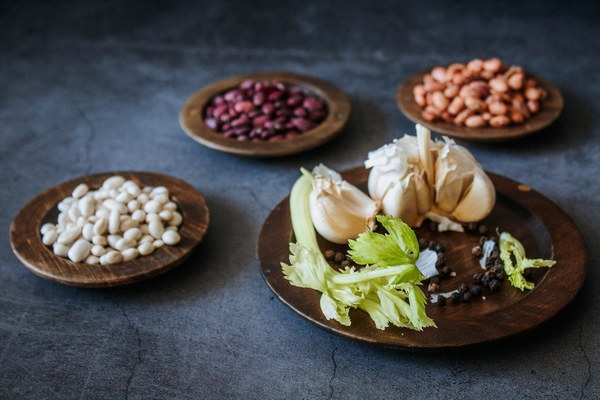Exploring the Diverse Dimensions of Food Therapy A Comprehensive Overview of its Various Categories
Food therapy, also known as nutritional therapy, has been a significant aspect of traditional medicine for centuries. This practice involves utilizing specific foods and dietary patterns to address various health issues, enhance overall well-being, and prevent diseases. Over time, numerous categories of food therapy have emerged, each with its unique principles and applications. In this article, we will explore the diverse dimensions of food therapy and delve into the different categories that exist.
1. Traditional Chinese Medicine (TCM) Food Therapy
Traditional Chinese Medicine (TCM) has a long-standing history of using food as medicine. TCM food therapy involves the use of natural ingredients that have been shown to have healing properties. It focuses on balancing the body's Yin and Yang energies, and it is categorized into the following types:
- Yin Foods: These foods are cooling and nourishing, such as soy milk, almonds, and peaches.
- Yang Foods: These foods are warming and energizing, such as ginger, garlic, and red meat.
- Neutral Foods: These foods have a balanced Yin and Yang energy, like rice, potatoes, and bananas.

2. Ayurvedic Food Therapy
Ayurveda, an ancient Indian system of medicine, emphasizes the importance of diet in maintaining health. This form of food therapy is based on the three doshas (Vata, Pitta, and Kapha) that represent the body's biological energies. Ayurvedic food therapy aims to balance these doshas through the following categories:
- Vata-Pacifying Foods: These foods help balance the Vata dosha, which is associated with movement and air. Examples include sweet, sour, and salty foods, like fruits, dairy products, and nuts.
- Pitta-Pacifying Foods: These foods help balance the Pitta dosha, which is associated with fire and energy. Cooling foods like milk, cucumber, and green leafy vegetables are recommended.
- Kapha-Pacifying Foods: These foods help balance the Kapha dosha, which is associated with earth and water. Spicy, dry, and light foods, such as chili peppers, turmeric, and legumes, are recommended.
3. Western Nutritional Therapy
In the Western world, nutritional therapy is based on the principles of biochemistry and physiology. It focuses on the nutritional needs of the body and aims to correct imbalances through dietary modifications. There are several categories of Western nutritional therapy, including:
- Low-Carb Diets: These diets emphasize reducing carbohydrate intake and increasing protein and fat consumption, such as the Atkins and South Beach diets.
- Plant-Based Diets: These diets focus on consuming plant-based foods, such as fruits, vegetables, nuts, and seeds, while minimizing or eliminating animal products.
- Fasting and Intermittent Fasting: These practices involve periods of restricted eating, followed by periods of normal eating, with the aim of promoting health and weight loss.
4. Detoxification Diets
Detoxification diets aim to remove toxins from the body and improve overall health. These diets typically involve consuming a limited number of foods, such as fruits, vegetables, and herbs, while avoiding processed foods, alcohol, and caffeine. Detoxification diets can be categorized into:
- Juice Fasts: These involve consuming only fruit and vegetable juices for a specific period, typically 1-3 days.
- Raw Food Diets: These diets emphasize consuming uncooked, unprocessed foods, such as fruits, vegetables, nuts, and seeds.
- Colon Cleansing Diets: These involve consuming foods and supplements that help cleanse the digestive system, such as psyllium husk and bentonite clay.
In conclusion, food therapy is a vast and diverse field, with various categories and principles guiding its practice. By understanding the different types of food therapy, individuals can make informed decisions about their dietary habits and overall health. Whether you're following the ancient wisdom of TCM, Ayurveda, or Western nutritional therapy, or exploring modern detoxification diets, food therapy offers a holistic approach to health and well-being.









